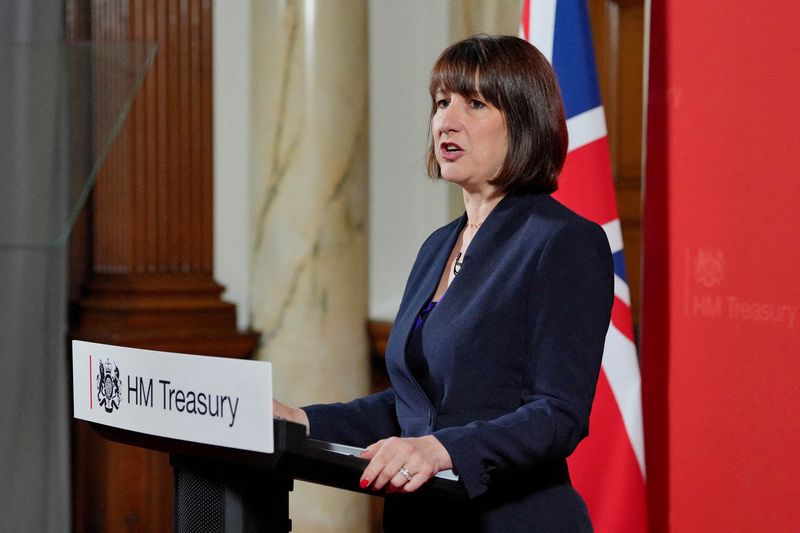By Andy Bruce
(Reuters) - British finance minister Rachel Reeves plans to raise taxes when she presents her budget in three months' time, but her options are limited by her promise not to increase taxes paid by "working people".
On Monday, Reeves said the Labour government, which won a landslide victory in the July 4 election, had inherited a hole in the public finances of 22 billion pounds ($28 billion).
She has warned that taxes would need to rise in the Oct. 31 Budget, while sticking to Labour's manifesto commitment that not to raise the rates of income tax, national insurance, value-added tax or corporation tax.
Below are some of Reeves' options:
CAPITAL GAINS TAX
Capital gains tax raised 15 billion pounds in the last financial year. While worth only around 4% of receipts from all taxes on income, Reeves may try to up that figure.
CGT is charged at a much lower rate than the upper rates of income tax, reflecting past attempts to encourage entrepreneurship. But this led hundreds of thousands of people to convert ordinary income into capital gains to lower their tax bill.
The Resolution Foundation think tank said Reeves could increase the rates of CGT but soften the blow by reintroducing indexation - meaning capital gains are taxed only after inflation. Together, these measures could raise 7.5 billion pounds.
She could also increase tax paid on dividends.
INHERITANCE TAX
A politically sensitive subject, past governments have avoided major reforms to inheritance tax, which is currently paid after only 4% of deaths, raising about 7.5 billion pounds per year.
IHT is paid at a rate of 40% on the value of estates above a threshold of 325,000 pounds - which has not changed since 2009. There are additional allowances for transferring family homes to younger generations.
The system has increasingly favoured wealthier families.
The Institute for Fiscal Studies thinks 2.7 billion pounds could be raised by making some IHT allowances - which exempt assets like family businesses, farmland, woodland and pension savings - less generous.
PENSION REFORMS
Reeves could tweak pension tax reliefs to raise more money - such as the tax-free lump sum, which enables pensioners to withdraw 25% of their pension as cash without paying tax, up to a value of 268,275 pounds.
The IFS estimates that removing this allowance completely could raise 5.5 billion pounds over the long run.
She could also reduce the generosity of tax reliefs on pension contributions for higher-rate taxpayers, by introducing a flat rate instead.
FUEL DUTY
Tax paid on motor fuels has been frozen every year since 2011 - except for a temporary cut in 2022/23.
Past governments had always in theory planned to raise fuel duty - flattering the outlook for the public finances - but in practice they never followed through, fearing a backlash from drivers.
Economists have long criticised this as a fiscal charade which Reeves could end on Oct. 31, burnishing the government's green credentials in the process.

In the March budget published by the previous Conservative government, the latest cancellation of the fuel duty rise cost more than 3 billion pounds in 2024/25.
($1 = 0.7792 pounds)